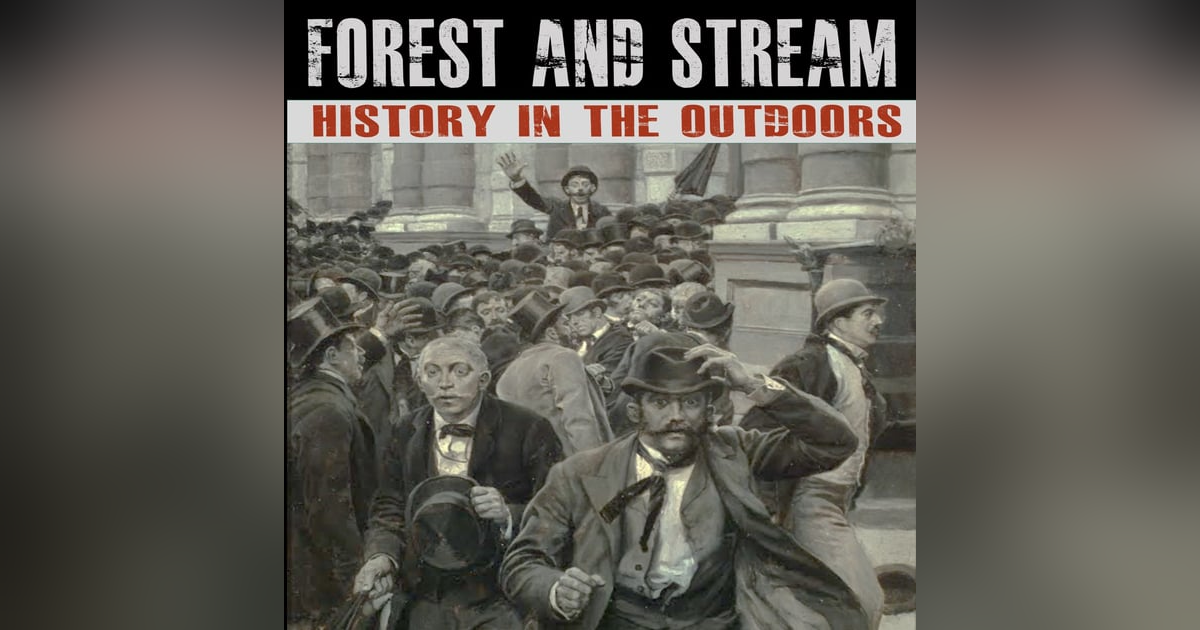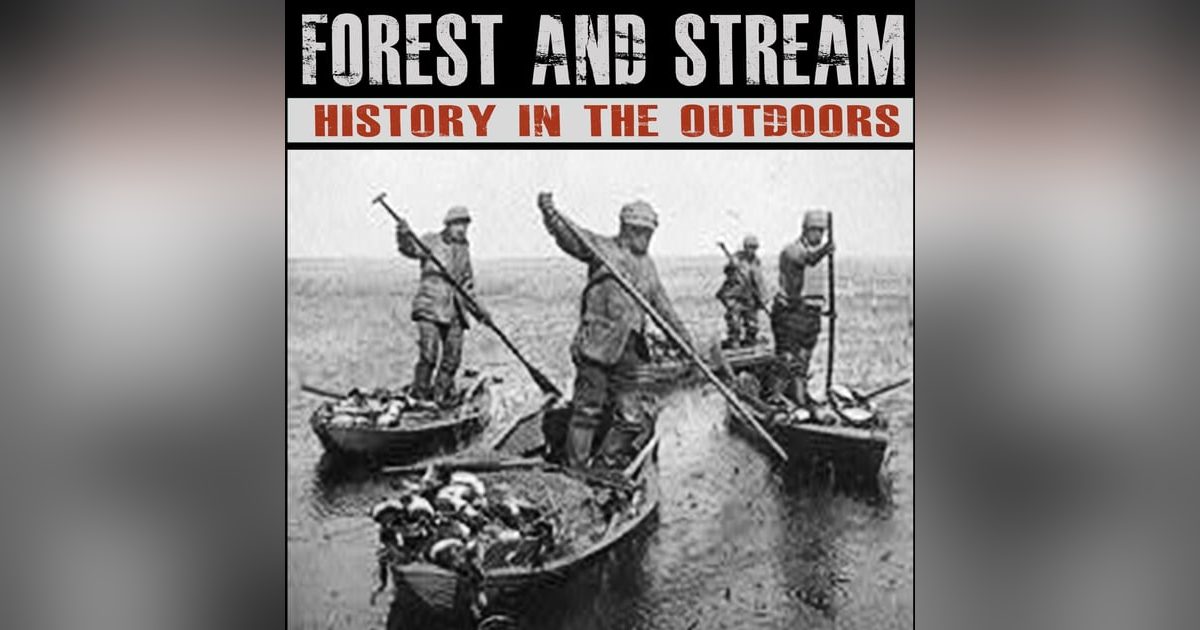Metaphysics of Deer Hunting - October 2, 1873

A sportsman takes to the woodlands following the Wall Street panic of 1873
More Episode Information:
Paul Smith's Hotel - Adirondacks
Paul Smith
JT HEADLEY
Joel Tyler Headley (December 30, 1813 – January 16, 1897) was an American clergyman, historian, author, newspaper editor, adventurer and politician who served as Secretary of State of New York. Headley belonged to the American Party.
___________________________________________________________
METAPHYSICS OF DEER HUNTING
When the financial panic was at its height last week, we visited a wealthy friend whose up-town mansion is palatial, his income from safe and judicious investments always ample and assured, and his bank account invariably showing a balance to his credit of many thousands. A gentleman who dabbles little in speculative risks; and whom cares of State and fluctuations of the market of late do not perplex ; one of those rare exceptions among men, content with sufficient and not ambitious for more. Surely, his was a case not, within the range of human probability, to be affected by any financial crash or monetary crisis.
And yet, so intricate and searching are the ramifications of disorder in times like these, when even the most provident and conservative find themselves suddenly cramped for means, that he was unable to command a dollar from ordinary or extraordinary resources. Said he: "I have a balance in bank of $20,000, but all the cash I can raise is a paltry two hundred dollars. It is just enough to take me to the Adirondacks. I am getting my guns and traps together, and tomorrow I start for Paul Smith's, to bury myself in the woods and seek oblivion until the storm is over!"
Happy the man who can thus drive dull care away at will, and turn aside the impending wave of trouble ! The bank to which he has confided his trusts may break in his absence and swallow all his surplus; the business, hitherto lucrative, in which he is a silent partner, may suspend and cut off his monthly income; dividend paying stocks may depreciate until they are quoted at half their value; bonds and mortgages may cease to be negotiable; still, like the ostrich with his head in the bush he may roam the forest in blissful ignorance of his misfortunes, and follow his quest for game with a blithesome heart and bounding step! Who would not be an ardent sportsman?
Such a man as this never allows business to interfere with his shooting. We wish the same were true of the herd of speculators who squeeze values, upset the market, and set the mercantile world at their wits end. Would that some good genius would inspire them to goof? For "a day's shooting," and stay until the panic subsides! Ah! there is some soothing influence in this going apart to commune with nature in her solitudes, that makes us forget the struggles of life and our worldly troubles. It banishes all inordinate desires, simplifies our tastes, and makes us contented with mere food, raiment and shelter, which, after all, constitute the sole necessaries of life.
This free existence among the woods, with heaven's canopy over us, the crisp and fallen leaves beneath our feet, and the pure untainted air to breathe: it gives us elasticity of step and expands the lungs; it enlarges the generous impulses of man; it dignifies his own self-respect; it makes him noble!
In this quiet unconcerned existence, he finds himself moving in a new world populous with strange creatures, with whom in time he learns to hold familiar converse. The little denizens of the stumps and hollow logs become accustomed to his presence at last. When the first sound of his coming footfall was heard, they all hid away. The first warning twig that snapped admonished them to be wary and lie perdu. All was silent as the grave, except when a rustling leaf dropped down, or a walnut slipped from its opening shell aloft. But presently the head of a little gopher popped from under a dry leaf, then his body crept stealthily out, and in a minute with a sharp squeak to show the coast was clear, he rustled away. Then a woodpecker peered cautiously from behind the trunk of a tree, and commenced to hammer, and from a neighboring limb a red squirrel sprung his sharp, shrill rattle. A garter snake glided noiselessly from under a stump and slid into a bog hole, from which an autumn frog already intoned his solemn staccato bass.
As we have said, one learns to comprehend the language of these little creatures, and understanding them thoroughly wonders how any man can be so unkind and thoughtless as to blow out their little lives with powder and shot. Even the deer begin to understand him at last, and if he is harmless and uses no gun, will repose such confidence in his honor that they will actually bring the rising generation of agile fawns to drink from the very spring that supplies his camp. Then when both have become better acquainted by closer contact, the sportsman will learn to look into their lustrous eyes as lovingly as did Don Juan into Donna Julia's; and all his conscience will rise up against him in reproof for his cruel slaughter in bygone years. His resentment will follow the hunter who dares to lay violent hands upon these innocent creatures whom he has learned to regard as his companions.
If his larder becomes empty, he will have to select another locality where the deer are wild. It is only when they are running, that he can make up his mind to shoot. If bucks and does would only walk gently up to the magnanimous hunter when they see him stalking in the distance, they would never get shot. Even the tiger seldom springs upon a creature that is not in motion. This is nature. We are a creation of pursuers and pursued, but not insatiable for that reason, by any means. If one will not run, there can be no pursuit. It is only human beings like the Neros, Herods, and Caligulas that butcher in cold blood.
These are the metaphysics of deer hunting. He who has studied the subject thoroughly, will find his thoughts yielding a responsive assent to their truthfulness.
Now is the time for enjoying the full fruition of the delights which a ramble in the forests affords. Whether it be in the eager pursuit of the chase, or in the simpler study of the gorgeous tints of autumn, in breathing the sharp, invigorating frosty air, or in seeking merely a temporary relaxation from business cares, the glorious month of October yields an appreciable reward which no other month affords.
Episode Part 2
THE WASTE OF TIMBER.
A Paragraph floating around states that the Indians upon the Leech Lake Reservation, in Minnesota, have become so enraged at the destruction of timber on their lands that they have taken the war path, and are burning the lumbermen's hay by way of reprisal.
Here is a lesson for the Hon. Joel T. Headley and those very few other gentlemen who deny that cutting away our forests will diminish our water supply, or work out climatic and organic changes that must prove detrimental.
Even the untutored savage can appreciate the value of our forests to the extent that, he not only implores that the "woodman spare that tree," but absolutely insists upon it in a way that is neither gentle nor kind. He realizes that the denudation of the earth is extermination to the red man, and that with the deep damnation of the taking off of its timber, food, fuel, shelter, navigable waters, and means of transportation all vanish.
Geology tells us that the mosses and ferns were the first vegetable products that grew upon the surface of the earth, and that, the pines and then the deciduous forest trees succeeded; and after them came animal life. By inversion, it is easy to determine that animal life must perish after the trees are destroyed.
It is the duty of man, by what he owes to his fellows, if not by the universal law of self-preservation, to prevent so sweeping a calamity. And man, when impelled to that sterner mood which horrible conviction brings, will not stop to "argify" the question with the Hon. J. T. Headley, et al, but, taking the ounce of prevention in his hands, make the advocates and defenders of timber-cutting "cut stick" in a fashion which will throw all the devices of the Minnesota redskins far in the shade.
Episode Part 3
Difference in Weights
Does a sportsman's full bag or basket ever feel heavy?
For the sensation of the strap over the shoulder is, doubtless, very different from what it would have been if, instead of beautiful trout, one has a twelve-pound cannon shot in the basket.
Indeed, this notion of weight, though absolute and positive, as marked by the scales of material philosophers, has got a variable force and signification, when sentiment lends vigor to the muscles.
For what sportsman, helping to carry home a fine buck, or what loving husband, taking a sick wife upstairs in his arms, or what young fellow, on whose back fortune had, for the moment, buckled a laughing lass of a hundred and forty pounds, to be carried over a slough, would feel the weight the same as if the burden were a bag of grain or a sack of salt ? — The Lawrences













